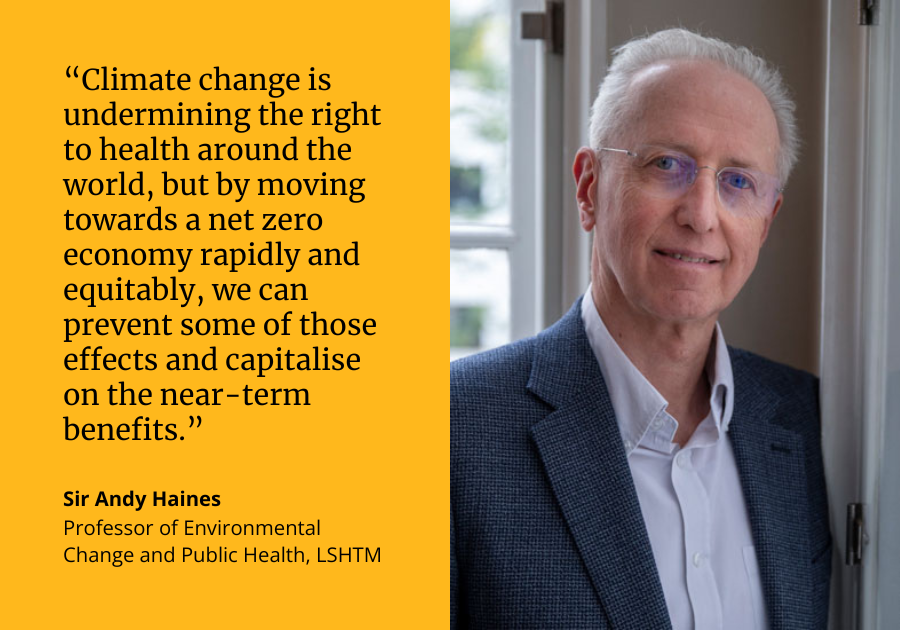
Climate change is already having major, unequal impacts on human health globally, and undermining the right to health. In 2022 the UN General Assembly officially recognised a clean, healthy and sustainable environment as a human right for all, in addition to the right to health. As people around the world face growing threats from the impacts of climate change, efforts to adapt and equitably phase out fossil fuels to tackle the climate crisis must be rapidly scaled up to protect human health and the environment.
Researchers at the London School of Hygiene & Tropical Medicine (LSHTM), collaborating with the University of Bern together with the Multi-Country Multi-City (MCC) Collaborative Research Network showed that climate change is already responsible for more than a third of all heat-related deaths. A recent analysis also found that the air pollution from burning fossil fuels accounts for an additional 5.1 million premature deaths a year worldwide.
Vulnerable populations are suffering the greatest burden of climate change, due to a combination of increased exposure to threats, and limited resources to adapt and build resilience. The impacts on vulnerable groups have been documented across the world, from pregnant farmers suffering complications under extreme heat in The Gambia to the increased hospitalisation of London’s homeless communities during heat waves.
In addition to the direct effects of climate change on health, LSHTM researchers are exploring the indirect impacts, such as the spread of vector-borne diseases, or reduced access to clean water and food. In 2021, it was estimated that up to 8.4 billion people could be at risk from dengue and malaria by 2100 if emissions continue to increase at current rates.
Evidently, the impacts of climate change threaten the human right to health and a healthy environment. But scientists are also demonstrating how solutions to address the climate crisis can safeguard the future of planetary health.
Health care systems that are resilient to climate change are crucial for protecting public health and access to healthcare. A team at LSHTM was recently awarded £2.4 million to better understand the impacts of flooding and heat on maternal healthcare in Brazil and Zambia, and how these health systems can be strengthened to build resilience.
Early warning systems can be used in various settings to provide alerts and allow protective measures to be implemented before events such as heat waves, or disease outbreaks. AXA UK and the AXA Research Fund are collaborating with LSHTM to develop a Global observatory which will use new forecasting systems to predict dengue outbreaks up to three months in advance, and help to prepare the public health response.
Adaptation to climate change is vital, but it will not be sufficient to protect people’s right to health. Action must also address the root cause.
A recent report by the Lancet Pathfinder Commission on pathways to a healthy net-zero future shows how climate mitigation action across different sectors has the potential to bring major near-term benefits to health. The report presents three main pathways that bring health-co benefits while enabling the transition to net-zero emissions: the rapid replacement of fossil fuels with clean, renewable energy; the increase of physical activity through active travel and public transport; and shifts to healthier, more sustainable diets. Even relatively small changes to diets can have significant benefits for health and the environment, as evidenced in a recent study which found that replacing red and processed meat with plant protein can increase life expectancy by up to 8.7 months, and reduce the diet-related carbon footprint by 25%.
Whilst actions across sectors and at a range of scales are steps in the right direction, scientists are calling for greater collaboration across sectors to enable transformative change that puts health at the centre of climate action.
Dr Sarah Whitmee, Assistant Professor in the Centre on Climate Change & Planetary Health (CCCPH) said, “There is growing evidence highlighting the links between climate change and health. Policies and actions must now meet the scale of the challenge, and ensure a just transition to net zero.”
Dr Rosie Green, Professor of Environment, Food and Health, and Co-Director of the CCCPH said, “Researchers from across LSHTM are combining their expertise and working together to tackle the climate crisis, providing evidence and innovative solutions to inform policies that will protect the right to health and a healthy environment worldwide.”
Sir Andy Haines, Professor of Environmental Change and Public Health at LSHTM said, “Climate change is undermining the right to health around the world, but by moving towards a net-zero economy rapidly and equitably, we can prevent some of those effects and capitalise on the near-term benefits.”
LSHTM's short courses provide opportunities to study specialised topics across a broad range of public and global health fields. From AMR to vaccines, travel medicine to clinical trials, and modelling to malaria, refresh your skills and join one of our short courses today.
